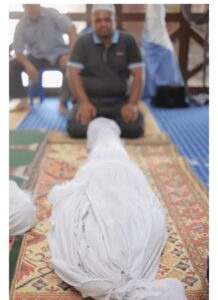Share
In the Islamic religion, death is not seen as the end but the beginning of the soul’s journey to the afterlife.
The Prophet Muhammad (peace be upon him) taught that the soul of an individual starts the transition process immediately after a person dies.
Muslims believe that transition should begin without delay.
“Hasten with the funeral, for it is righteous, you will be taking it forward to what is good; and if it is otherwise, you will be laying evil off your necks,” Prophet Muhammad.
This teaching forms the foundation of why Muslims do not postpone burial. Once death is confirmed, every effort is made to wash, pray over him/her, and bury the person as soon as possible.
Simplicity and Humility in Islamic Funerals
Modesty rather than extravagance characterizes the Islamic funerals.
It centers on prayer, forgiveness, and giving the body back to the Creator. Typical rituals include:
Ghusl – The ritual washing of the body is performed by close relatives or community members
Kafan – It is wrapped in a plain white cloth, with no flashy clothing or make-up.
Salat al-Janazah – A funeral prayer which is often performed at a mosque or an open field.
Burial- The body is buried directly in the ground, facing the direction of Mecca.
Also Read: What Happens If You Die With Money in M-PESA Without Leaving a PIN Number?
Practical Reasons for Swift Burial
Beyond spiritual beliefs, there are practical reasons why the burial is hastened:
Rapid Decomposition – The bodies in hot climates decompose very fast.
The burial should also be done immediately to avoid any unpleasant situations and maintain hygiene.
Avoiding Unnecessary Delays- Islam discourages holding the body while waiting for relatives or guests.
The intended persons will be on time, and prayers can go on even after the burial.
Peace to the dead – just as it is required that human beings have peace in life, the dead need peace in death.
Postponed burial or cosmetic alterations on the body are viewed as an unnecessary disturbance.
Also Read: What Happens to Your Social Media Accounts When You Die?
Mourning with Modesty
Muslims mourn but with restraint and dignity.
Three-Day Mourning Period – Family and friends mourn, pray, and remember the deceased in silence.
Iddah for Widows – Widows observe a longer period of four months and ten days, stay home to reflect and grieve privately.
Islamic burial practices might appear swift, unlike other traditions, but they are deeply sacred.
Quick burial honours the dead, respects God’s instructions, and ensures the soul begins its journey in peace.
Follow our WhatsApp Channel and WhatsApp Community for instant news updates

Islamic funerals are deeply humble
Image/VerseNews
